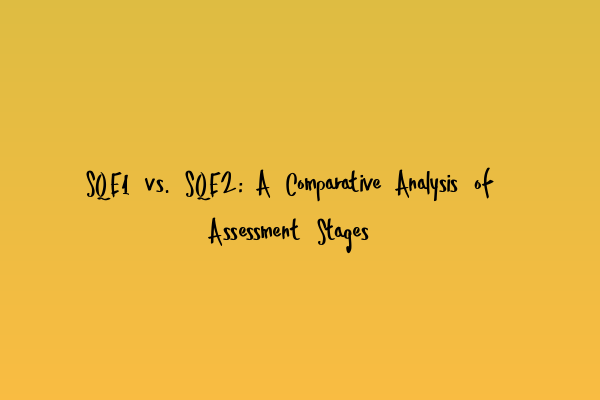SQE1 vs. SQE2: A Comparative Analysis of Assessment Stages
Introduction
The Solicitors Qualifying Examination (SQE) has been introduced as a new route to qualify as a solicitor in England and Wales. With its implementation, aspiring solicitors now face two assessment stages, known as SQE1 and SQE2. This blog post aims to provide a comprehensive comparative analysis of these two assessment stages, highlighting their similarities, differences, and key aspects that candidates should be aware of.
Overview of SQE1
SQE1 is the first assessment stage of the SQE, focusing on assessing candidates’ functioning legal knowledge. It consists of two exams, each lasting 180 minutes. Let’s delve deeper into the key features of SQE1:
1. Content: SQE1 tests candidates on substantive and procedural law, with a strong emphasis on core areas such as contract law, tort law, criminal law, and public law. It is essential for candidates to have a solid foundation in these areas to excel in this stage.
2. Format: The exams in SQE1 comprise multiple-choice questions (MCQs) and single-best-answer questions (SBAs). These question formats require candidates to carefully analyze the options and select the most accurate answer.
3. Assessment Objective: The primary objective of SQE1 is to assess candidates’ knowledge and understanding of the law. It tests their ability to apply legal principles to practical scenarios, ensuring their competence in handling legal issues.
Overview of SQE2
SQE2 is the second assessment stage of the SQE, focusing on evaluating candidates’ practical legal skills. This stage aims to assess candidates’ ability to apply legal knowledge in practice. Here are the key features of SQE2:
1. Content: SQE2 covers a wide range of legal skills, including legal research, drafting, writing, advocacy, interviewing, and negotiation. This stage emphasizes practical application and real-world scenarios, providing candidates with the opportunity to demonstrate their skills and abilities.
2. Format: Unlike SQE1, SQE2 is not a written examination. Instead, it consists of a series of practical assessments that simulate real legal tasks. These assessments can include written assignments, mock court hearings, interviews with clients, and negotiation exercises.
3. Assessment Objective: The primary objective of SQE2 is to evaluate candidates’ practical competency in applying legal skills to real cases. It aims to determine whether candidates can effectively deal with complex legal issues, communicate clearly and persuasively, and provide sound legal advice.
Comparison of SQE1 and SQE2
While both SQE1 and SQE2 are integral parts of the SQE assessment process, they differ significantly in terms of their content, format, and assessment objectives:
1. Content: SQE1 primarily focuses on assessing candidates’ legal knowledge and understanding of core legal principles. In contrast, SQE2 evaluates their practical skills and ability to apply legal principles in real-life scenarios.
2. Format: SQE1 employs MCQs and SBAs, whereas SQE2 utilizes practical assessments and simulations. SQE1 requires candidates to select the correct answers from options, while SQE2 demands the application of legal knowledge and skills.
3. Assessment Objective: SQE1 aims to determine candidates’ depth of legal knowledge and their ability to apply legal principles accurately. SQE2, on the other hand, focuses on evaluating candidates’ practical competency, including their ability to research, draft legal documents, and communicate effectively.
Conclusion
In conclusion, both SQE1 and SQE2 play vital roles in the Solicitors Qualifying Examination (SQE), assessing candidates’ legal knowledge and practical skills, respectively. While SQE1 assesses candidates’ legal knowledge through multiple-choice and single-best-answer questions, SQE2 evaluates their ability to apply legal skills in practical scenarios. Aspiring solicitors must be well-prepared for both stages of the SQE to enhance their chances of success. By understanding the similarities and differences between SQE1 and SQE2, candidates can develop targeted study strategies and focus on strengthening their areas of weakness. So, take the time to prepare thoroughly, and best of luck on your SQE journey!

Leave a Reply